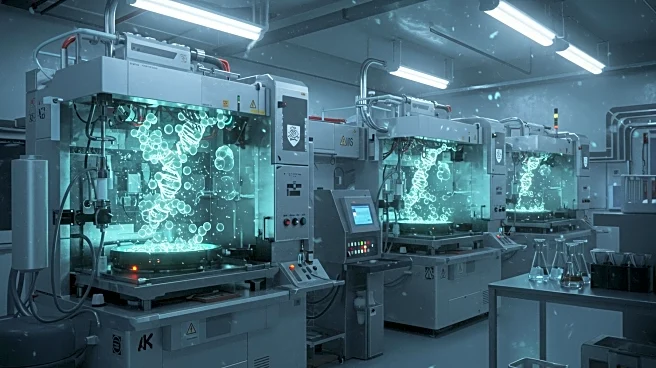What's Happening?
Moderna is making significant strides in the mRNA vaccine market through strategic manufacturing expansions and regulatory approvals. The company has invested $1.5 billion in a new facility in Laval, Quebec, which is now operational under Health Canada's Drug Establishment License. This facility is capable of producing 30 million doses annually, with scalability to 100 million during pandemics. Additionally, Moderna has partnered with Novocol Pharma in Ontario for fill-finish operations, enhancing its supply chain resilience. On the regulatory front, Moderna's dual-target vaccine, mRNA-1083, has received approvals in Europe, Japan, and Switzerland. This vaccine targets both SARS-CoV-2 and influenza, offering a single-dose solution that has shown superior performance in Phase III trials compared to existing vaccines. These developments are expected to bolster Moderna's competitive edge and long-term revenue potential.
Why It's Important?
Moderna's strategic moves are pivotal in the evolving mRNA vaccine landscape. By localizing production in Canada, the company reduces lead times and mitigates global supply chain risks, aligning with Canada's net-zero emissions goals. The approval of mRNA-1083 positions Moderna as a leader in the dual-target vaccine market, addressing critical gaps in influenza B coverage, particularly for aging populations. These advancements not only enhance Moderna's market position but also contribute to public health by providing more effective vaccination options. Financially, these developments are expected to improve Moderna's margins and revenue, with significant sales anticipated in the latter half of 2025. The company's efforts to decentralize production and innovate in vaccine development could lead to long-term growth and stability.
What's Next?
Moderna's focus will likely be on scaling production at its Canadian facility and expanding its market reach for mRNA-1083. The company aims to leverage public vaccination programs and private-sector partnerships to diversify its revenue streams. Investors and stakeholders will be watching the success of Canada's fall vaccination campaign and potential regulatory approvals in additional markets. Moderna's pipeline of next-generation vaccines, including those for oncology and rare diseases, could further drive revenue diversification and market expansion. The company's goal to achieve breakeven by 2028 will depend on the success of these initiatives and the scalability of its operations.
Beyond the Headlines
Moderna's expansion and regulatory achievements highlight broader trends in the pharmaceutical industry, such as the shift towards decentralized production and the importance of supply chain resilience. These moves also reflect a growing emphasis on sustainability and local job creation, fostering goodwill with governments and communities. The company's leadership in mRNA technology positions it as a key player in addressing global health challenges, potentially influencing future public health policies and vaccination strategies.










